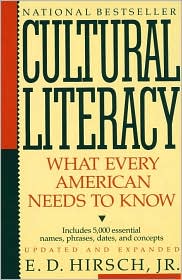
In 1988, E. D. Hirsch, a professor at the University of Virginia, wrote a best selling book which argued that progressivist education with its focus on experience had let down America’s students by neglecting knowledge in the form of a shared body of information. The book included a list of 5,000 facts, dates, famous people, works of literature and concepts that every American should know. Hirsch was later to call this ‘core knowledge’.
The theories that have dominated American education for the past fifty years stem ultimately from Jean Jacques Rousseau, who believed that we should encourage that natural development of young children and not impose adult ideas upon the before they can truly understand them … He thought that a child’s intellectual and social skills would develop naturally without regard to the specific content of education … In the first decades of [the twentieth] century, Rousseau’s ideas powerfully influenced the educational conceptions of John Dewey, the writer who has most deeply affected modern educational theory and practice … Dewey strongly seconds Rousseau’s opposition to the mere accumulation of information: ‘Development emphasizes the need of intimate and extensive personal acquaintance with a small number of typical situations with a view to mastering the way of dealing with the problems of experience, not the piling up of information’ …
Dewey assumed that … education need not be tied to specific content. [However, in so doing he] placed too much faith in children’s ability to learn general skills … and too hastily rejected ‘the piling up of information’. Only by piling up specific, communally shared information can children learn to participate in complex cooperative activities with other members of their community …
[It is a] universal fact that a human group must have effective communications to function effectively, that effective communications require shared culture and that shared culture requires transmission of specific information to children. Literacy, an essential aim of education in the modern world, is no autonomous, empty skill but depends upon literate culture. Like any other aspect of acculturation, literacy requires the early and continued transmission of specific information. Dewey was deeply mistaken to disdain ‘accumulating information in the form of symbols.’ Only by accumulating shared symbols, and the shared information that the symbols represent, can we learn to communicate effectively with one another in our national community …
Cafeteria-style education, combined with the unwillingness of our schools to place demands on students, has resulted in a steady diminishment of commonly shared information between generations and between young people themselves. Those who graduate from the same school have often studied different subjects, and those who graduate from different schools have often studied different material even when their courses have carried the same titles. The inevitable consequence of the shopping mall high school is a lack of shared knowledge across and within schools. It would be hard to invent a more effective recipe for cultural fragmentation …
To be culturally literate is to possess the basic information needed to thrive in the modern world … That children from poor and illiterate homes tend to remain poor and illiterate is an unacceptable failure of our schools, on which has occurred not because our teachers are inept but chiefly because they are compelled to teach a fragmented curriculum based on faulty educational theories. Some say that our schools by themselves are powerless to change the cycle of poverty and illiteracy. I do not agree. They can break the cycle, but only if they themselves break fundamentally with some of the theories and practices that education professors and school administrators have followed over the past fifty years …
It is true that, under our present curricular arrangements, academic achievement is heavily determined by family background. But we cannot conclude from the present sate of affairs that deprived children would be predestined to low achievement under a different school curriculum …
Literate culture is the most democratic culture in our land: it excludes nobody; it cuts across generations and social groups and classes; it is not usually one’s first culture, but it should be everyone’s second, existing as it does beyond the narrow spheres of family, neighborhood, and region.
To withhold traditional culture from the school curriculum, and therefore from students, in the name of progressive ideas is in fact an unprogressive action that helps preserve the political and economic status quo. Middle-class children acquire mainstream literate culture by daily encounters with other literate persons. But less privileged children are denied consistent interchanges with literate persons and fail to receive this information in school. The most straightforward antidote to their deprivation is to make the essential information more readily available inside the schools.
http://www.coreknowledge.org/who-we-are
Hirsch, E.D. 1988. Cultural Literacy: What Every American Needs to Know. New York: Vintage Books. pp. xiv–xv, xvii, 20–21, xiii, 115, 21, 23–24.
